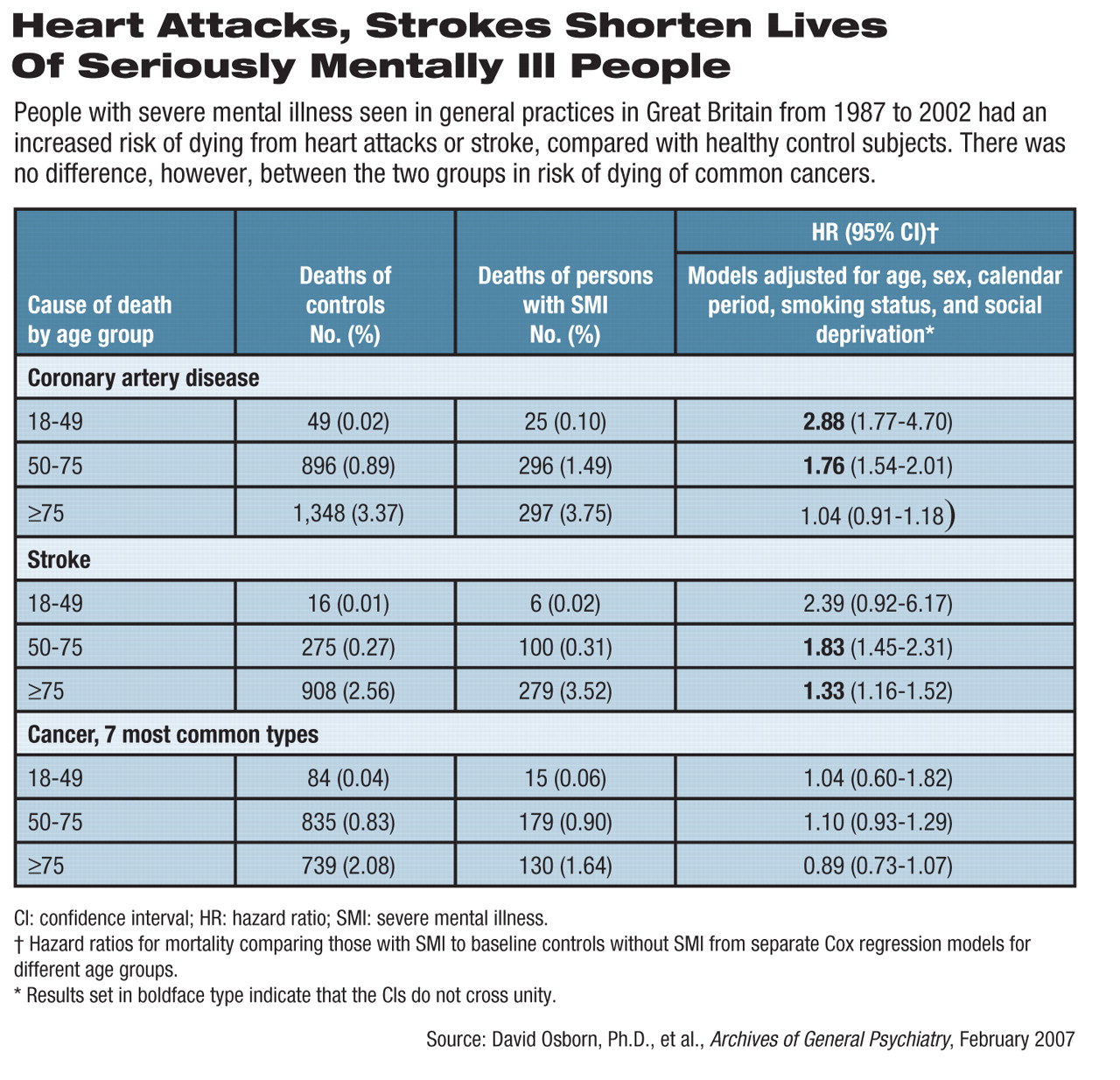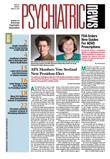People with severe mental illness are two or three times more likely to die of heart disease or stroke than are control subjects, and the risk was even greater for those taking antipsychotic medications, according to a large study of primary care practices in the United Kingdom.
The same study found no increase in cancer mortality for persons with mental illness, however.
The researchers drew on data compiled from 1987 to 2002 in the General Practice Research Database (GPRD), covering 741 general practices in England, Wales, Scotland, and Northern Ireland. Out of 8 million patients, they identified 46,136 adults diagnosed after age 18 with schizophrenia, schizoaffective disorder, bipolar disorder, or delusional disorder. They compared them with 300,426 randomly selected controls who had never been diagnosed with those conditions.
The study, led by David Osborn, Ph.D., of the Department of Mental Health Sciences at the Royal Free and University College Medical School in London, appeared in the February Archives of General Psychiatry.

Coronary heart disease mortality among people with serious mental illness registered a threefold increase between the ages of 18 and 49 and almost a twofold increase between the ages of 50 and 75 years, Osborn and colleagues reported. Stroke death rates were 2.5 times greater in those under 50 years old and almost twice as high among those 50 to 75 years old. Absolute numbers of deaths in the youngest cohort were small, they said, but the increased risk in both these age groups was a worrisome pattern.
Data on smoking were available for just over half of the study population. More of the mentally ill cohort (51 percent) smoked than did the controls (39 percent), but adjustment for smoking and social deprivation did not alter the results.
Osborn and his colleagues also looked at the relation between serious mental illness and deaths from seven common cancers: respiratory, colorectal, breast, prostate, stomach, esophageal, and pancreatic. With one exception, they found no increase in hazard ratio for these diseases. An initial increase in risk for respiratory cancers was no longer statistically significant after adjusting for smoking and social deprivation.
The researchers also found a direct relationship between antipsychotic medication use and risk of heart disease or stroke.
“People with [serious mental illness] who were not prescribed any antipsychotics were at increased risk of coronary heart disease and stroke than controls, whereas those prescribed such agents were at even greater risk,” they wrote. “Those receiving the higher doses were at greatest risk of death from both coronary heart disease and stroke.”
The data were strongest in the 50- to 75-year-old group, in which those taking the highest doses of antipsychotics were 2.49 times more likely to die than controls (p<.001).
They found no difference between typical and atypical antipsychotics, a lack of association that is “counterintuitive given the interest in metabolic effects of such agents.”
What might account for the greater risk associated with antipsychotic use? It could be due to adverse effects from higher doses, Osborn speculated. Or, higher doses could reflect more severe illness, which could lead to poor diet, less exercise, or increased smoking.
Although the duty to manage cardiovascular risk factors like blood pressure, cholesterol and glucose levels, and smoking usually falls to primary care physicians, psychiatrists should also be prepared to monitor physical health as part of their job, too, said Osborn.
 Coronary heart disease mortality among people with serious mental illness registered a threefold increase between the ages of 18 and 49 and almost a twofold increase between the ages of 50 and 75 years, Osborn and colleagues reported. Stroke death rates were 2.5 times greater in those under 50 years old and almost twice as high among those 50 to 75 years old. Absolute numbers of deaths in the youngest cohort were small, they said, but the increased risk in both these age groups was a worrisome pattern.
Coronary heart disease mortality among people with serious mental illness registered a threefold increase between the ages of 18 and 49 and almost a twofold increase between the ages of 50 and 75 years, Osborn and colleagues reported. Stroke death rates were 2.5 times greater in those under 50 years old and almost twice as high among those 50 to 75 years old. Absolute numbers of deaths in the youngest cohort were small, they said, but the increased risk in both these age groups was a worrisome pattern.